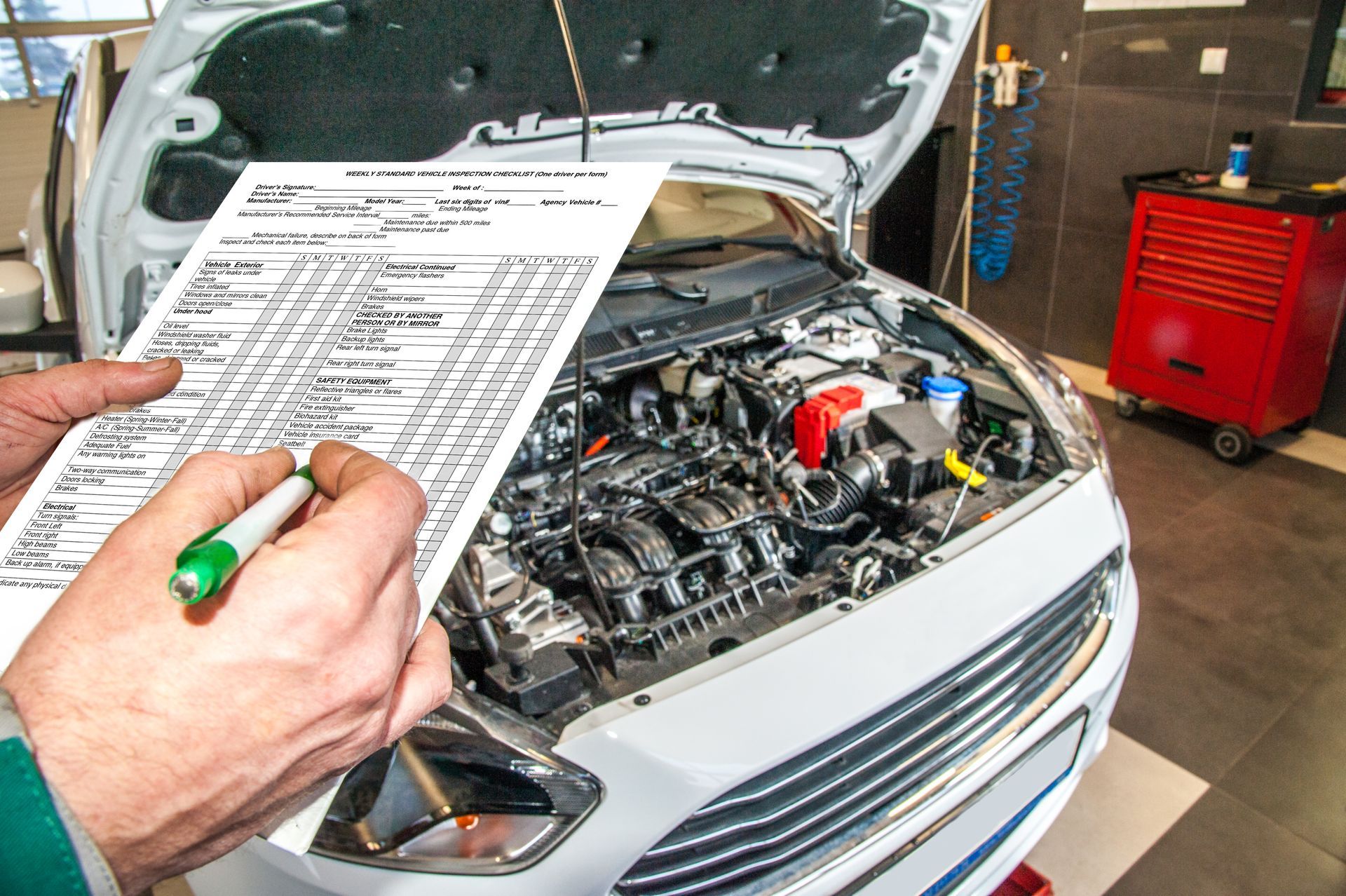April 3, 2025
Automatic Transmission Repair: What You Need to Know to Keep Your Car Running Smoothly If you’ve ever had trouble with your car’s automatic transmission, you know it can be one of the most stressful issues to deal with. The transmission is a crucial part of your car that controls how the engine’s power gets transferred to the wheels, allowing you to drive smoothly and shift gears automatically without lifting a finger. But just like any other complex system in your vehicle, your transmission can face problems over time, leading to the need for repairs or even replacement. In this blog, we’ll take a closer look at automatic transmission repairs—how transmissions work, what problems might arise, and what you can do to maintain yours. Let’s get started! What Exactly is an Automatic Transmission? Before diving into repairs, let’s first understand what an automatic transmission does. An automatic transmission automatically changes the gears in your vehicle without you having to manually shift them, unlike a manual transmission, which requires you to engage the clutch and shift gears yourself. This system works through a combination of gears, hydraulic systems, and sensors that detect the optimal time to shift based on factors like your speed, engine load, and how much you press the accelerator. Most people enjoy the convenience of automatic transmissions, especially in heavy traffic where shifting gears constantly would be tiring. Signs Your Transmission Needs Attention The good news is that automatic transmission problems often give you clues before they get too severe. Here are some common signs that your transmission may be struggling: 1. Slipping Gears If your car suddenly changes gears on its own or has trouble staying in gear, it’s a sign of a slipping transmission. You might notice your engine revving high but your car’s speed not matching, or a delay when shifting gears. Slipping gears can often happen when transmission fluid levels are low, or when there’s internal damage, so it’s important to get it checked soon. 2. Rough or Delayed Shifting Your car should shift gears smoothly and without hesitation. If you feel a jolt or delay before the car shifts, or if the gear changes feel rough or jerky, it could point to a transmission problem. This is often caused by low transmission fluid, worn-out gears, or a malfunctioning solenoid. 3. Strange Noises Grinding, whining, or clunking noises while your car is in gear can signal internal transmission problems. These sounds are often caused by worn-out gears or low fluid. If the sounds persist, it’s a good idea to have a professional mechanic take a look. 4. Warning Lights Most cars today are equipped with onboard diagnostic systems that alert you to potential problems. If you see the “Check Engine” light or a specific transmission warning light, it’s time to have your vehicle checked out. Often, the computer will throw a code that can pinpoint the issue, which could range from low fluid to a serious internal issue. 5. Fluid Leaks Transmission fluid is crucial to keeping everything running smoothly. If you see red or brown fluid under your car, it’s likely that your transmission is leaking. Without enough fluid, the transmission can overheat and fail, leading to costly repairs. 6. Sluggish Acceleration If your car struggles to accelerate or feels sluggish when you press the gas pedal, the issue may be with the transmission. It could be related to worn-out components or low fluid levels. In any case, it’s important to address this issue promptly to avoid further damage. What Causes Transmission Problems? There are a number of reasons why your transmission might start to malfunction. Some of the most common causes include: 1. Low or Contaminated Fluid Transmission fluid is vital for lubrication and cooling. If your transmission fluid is low or contaminated with dirt and debris, it can lead to overheating, poor shifting, and even internal damage. Keeping your fluid levels in check and changing the fluid as recommended by your vehicle’s manufacturer can help prevent issues. 2. Worn Clutch Plates In an automatic transmission, clutch plates are responsible for engaging and disengaging the gears. Over time, these plates wear out, leading to slipping or delayed shifting. If the clutch plates aren’t replaced, you could experience serious transmission failure. 3. Faulty Solenoids Solenoids control the flow of fluid in the transmission. If a solenoid malfunctions, it can cause the car to shift erratically, or not shift at all. Sometimes, a simple solenoid replacement can fix the problem. 4. Worn Gears and Bands Like any mechanical component, gears and bands inside the transmission wear out over time. Worn gears can cause your car to skip or slip out of gear, while worn bands can result in harsh or delayed shifting. These issues can often be fixed by replacing the damaged components. 5. Electrical Issues Modern cars rely on electrical systems, such as sensors and wiring, to manage shifting. If there’s an electrical failure, such as a faulty sensor or damaged wiring, it can cause the transmission to misbehave, leading to erratic shifts or a complete failure to engage gears. What Happens During Automatic Transmission Repair? When you bring your car in for transmission repair, the mechanic will go through several steps to diagnose and fix the issue. Here’s a breakdown of what that might look like: 1. Diagnosis The first step in transmission repair is diagnosing the problem. A mechanic will hook your car up to a diagnostic tool to check for any trouble codes stored in the vehicle’s computer. They may also take your car for a test drive to identify symptoms like rough shifting or slipping. If the issue is fluid-related, the mechanic will inspect the fluid to see if it’s low or dirty. 2. Fluid Change or Flush In some cases, the transmission fluid is the culprit. If the fluid is low or contaminated, the mechanic will either top it off or perform a complete fluid flush. During a fluid flush, the old fluid is drained, and the transmission system is cleaned before fresh fluid is added. 3. Repairing or Replacing Damaged Parts If the problem is related to a specific part, such as a solenoid, clutch plate, or worn-out gear, the mechanic will replace or repair that part. In more severe cases, if multiple components are damaged, they may need to rebuild the entire transmission. 4. Reassembly and Testing After the necessary repairs are completed, the transmission will be reassembled, and the mechanic will perform tests to ensure everything is working as it should. This includes checking for smooth shifting, proper acceleration, and proper fluid levels. Tips for Maintaining Your Automatic Transmission The best way to avoid expensive repairs is to take care of your transmission in the first place. Here are a few tips to help you maintain your automatic transmission: 1. Check and Change Transmission Fluid Regularly Your car’s transmission fluid should be checked regularly. Make sure to follow the manufacturer’s recommended fluid change schedule. Clean, fresh fluid keeps the transmission running smoothly and reduces the risk of internal damage. 2. Use the Right Fluid Always use the type and grade of transmission fluid recommended by your car’s manufacturer. Using the wrong fluid can cause issues like poor shifting or overheating. 3. Avoid Overheating Transmission overheating is a leading cause of failure. If you regularly tow heavy loads, or if you often drive in stop-and-go traffic or on steep hills, consider installing a transmission cooler to help regulate the temperature. 4. Drive Smoothly Aggressive driving—like hard accelerations, abrupt braking, and high-speed shifts—puts a lot of stress on your transmission. To help preserve its life, try to drive smoothly and avoid sudden, jerky movements. 5. Get Regular Maintenance Routine maintenance is essential for keeping your transmission in good shape. Have it inspected regularly by a professional mechanic to catch any potential problems before they become serious. Conclusion Automatic transmission repair can seem intimidating, but understanding the signs of problems and how to maintain your transmission can help you avoid costly repairs down the road. By checking fluid levels, using the right transmission fluid, driving smoothly, and getting regular maintenance, you can keep your car running smoothly for years to come. If you suspect something is wrong with your transmission, don’t wait. Early diagnosis and repair can save you a lot of money and hassle. With the right care and attention, your car’s transmission will continue to serve you well for many miles.










